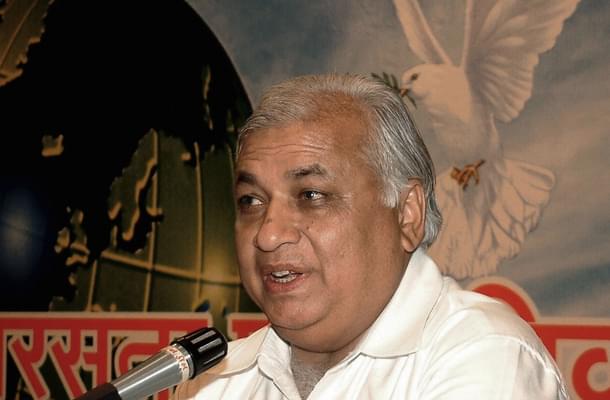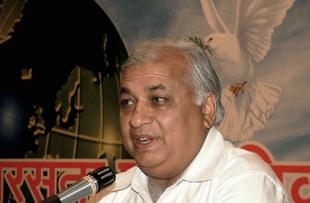Politics
Triple Talaq Violates The Spirit Of Both The Quran And The Constitution: Arif Mohammad Khan
Shitanshu Shekhar Shukla
Oct 26, 2016, 11:59 AM | Updated 11:59 AM IST
Save & read from anywhere!
Bookmark stories for easy access on any device or the Swarajya app.


Arif Mohammad Khan needs no introduction to the readers. He is an incorrigible optimist. Despite the rapid political degeneration in India, he does not agree to a pessimistic analysis of our times.
Shitanshu Shekhar Shukla speaks to him to understand what has changed since 23 August 1985, when Khan, then minister of state for Home Affairs in the Rajiv Gandhi government, delivered a passionate speech in the Lok Sabha defending the Supreme Court judgement in the Shah Bano case.
When the bill was introduced by G M Banatwala to circumvent the Supreme Court judgement, “sitting two benches behind the law minister”, Khan wrote his resignation.
Excerpts:
What does the Quran say about triple talaq?
Provisions of the Quran on this issue are crystal clear and leave no scope for any human clarification.
In cases of marital disputes, it spells out a detailed and time-consuming procedure for its resolution and goes to a great length to save a family from any breakup.
As a first step in 4.34, it says: “As to those women on whose part you fear disloyalty and ill conduct, admonish them first, then refuse to share bed,” and so on.
The second step laid down in 4.35 says: “If you fear breach between them, appoint two arbiters, one from his family and the other from hers, if they wish for peace, God will cause their reconciliation.”
If all these attempts to reconcile fail, then it is deemed better for them to separate. But even at this stage, the separation will be effective after three months of iddat or a cooling-off period, during which they can review and reverse their decision.
The Quran says in 65.1: “When you divorce women, divorce them at their prescribed periods and count their prescribed periods (accurately). And fear God, your Lord. And turn them not out of their houses, nor shall they themselves leave. These are limits set by God: and any who transgresses the limits of Allah, does verily wrongs his own soul. For you know not if perchance God will bring out thereafter some new situation”.
Now, divorce through this long procedure is permissible only twice in life (2.29), and it allows the reunion of a husband and wife during iddat and remarriage after the iddat is over (2.232).
It is clear from these provisions that the Quran tries hard to save the family from splitting, and a prophetic narration declares divorce as “most odious among permissible things”.
What does the Quran say about polygamy?
My understanding is that the Quran prescribes monogamy as a norm and permits polygamy under exceptional circumstances with conditions which the Quran itself says are beyond ordinary human capability to meet.
In 24.32, it says: “Marry those among you who are single.” Now, this verse is addressed both to men and women and it is in the nature of a command.
The verse that talks about polygamy (4.3) essentially deals with safeguarding the rights of girls and women who had become orphans and widows as a result of the brutal attack by the Meccans on Medina, where the Prophet and his band of followers were living after migration. In a community of about three-hundred men, more than 73 were killed. Then, there was a need to help the widows of the slain and their orphan girls.
On this occasion, the Quran said: “If you fear that you shall not be able to deal justly with the orphans, marry women of your choice, two or three or four, but if you fear that you shall not be able to deal justly, then only one.”
Further, the Quran makes it clear in 4.129 that: “You are never able to do justice among wives even if it is your ardent desire.” Now, it is strange that the jurists who framed the laws ignored the command for monogamy and adopted conditional permission for polygamy as an unrestrained right for the Muslim males.
Is there a need for modernity among Muslims only?
I do not think anybody disputes the fact that there is a need for everybody to move ahead both in terms of development and progress, which together are known as modernity. Modernity does not mean any special kind of dressing or food habits; modernity means to be in sync with the times in which you are living.
In fact, I would like to refer to a saying of Maula Ali on the subject of how to raise your children. He said, “While raising your children, always remember the fact that your children will live in an age that will be radically different from the age in which you are living. Therefore, instead of imposing your thoughts on their minds, help them to prepare themselves to live successfully in their own times.”
On this subject, the Quran very clearly says: “Unless you go forth, God will punish you grievously and replace you by another set of people (9.39).
We must have a sense of history, we must be rooted in the past, but we cannot afford to live in the past. We live in the present, but a sense of history equips us with experience and wisdom to make our future better.
What is your view on the petition in the Supreme Court that seeks to abolish the triple talaq practice?
I have already explained the Quranic position on divorce. In that light, one can safely say that the practice of triple talaq is an enormity. It violates the letter and spirit of both the Quran and the Constitution of India.
In fact, this right to triple divorce dehumanises Muslim women. More than actually happening, it is this awareness that the husband has the absolute and unrestrained right to turn the woman out by making three pronouncements of divorce that amounts to oppression and cruelty in a marriage.
This practice must be abolished as soon as possible. But simple abolition will not yield fruitful results. Like the constitutional abolition of untouchability needed a law to punish those who committed atrocities against the Dalits, we need some penal provision to punish those who resort to this nefarious practice. We have a precedent from Muslim history. Hadrat Umar used to award a punishment of forty lashes to anyone who made three pronouncements of divorce in one sitting. We cannot lash anybody today, but can provide for three years of rigorous imprisonment for this crime.
What is your view about the Union government's affidavit in SC? Is it an apolitical stand?
Triple divorce grossly violates the provisions of the Constitution of India, and the primary duty of the government is to uphold the law of the land. Therefore, the affidavit filed by the government was the only rightful course for them, and instead of attributing any political motives, it must be welcomed.
Why are the Muslim personal board and the Muslim religious bodies opposing the abolition of triple talaq?
Personal Law Board is essentially a body comprising clerics associated with Madrasas. They show no interest in the moral and spiritual values of Islam, like God-consciousness, compassion, honesty, charity, integrity etc., nor speak about them.
They are concerned only about law, which needs an enforcement agency, and they see themselves as that agency. This gives them a sense of power and domination over others which they exercise through the instrumentality of fatwas. Once triple talaq is abolished, you will see that the number of fatwas they issue every year will come down drastically.
Who do you think is likely to win the UP polls?
I am no astrologer, and instead of making political predictions, I am more interested in the abolition of the evil of triple divorce.
What is your assessment about the Muslim voters in UP? What is their priority? Is triple talaq going to be an agenda of UP polls?
No idea; rather, I feel very disturbed when we try to make political assessment on the basis of religious affiliation of the citizens. I feel we must be mindful of the idiom and terminology and refrain from using language that only promotes communalism.
Arun Jaitley and Venkaiah Naidu have said that it should not be linked to UCC (uniform civil code). What is your view?
I agree that the issue of abolition of triple talaq has no relationship with UCC. We are talking about triple talaq because the Shariat Application Act 1937 is a law enacted by Indian Legislature. The provisions of this Act, like any other law, in so far as they are inconsistent with the fundamental rights, must be declared void.
On the other hand, UCC is one of the directive principles, not judicially enforceable but fundamental in the governance of the country, and the government is obligated to apply these principles in making laws. So far, the government has not proposed or circulated any draft; therefore, linking the two amounts to muddying the waters.
Why did the Cong do a U-turn on the Shah Bano case? While MJ Akbar and Najma Heptullah, who prevailed on Rajiv Gandhi to challenge the Shah Bano verdict, have since switched sides, you were overlooked by Congress despite your better profile.
I am not in a position to reply to this question. But there cannot be any doubt that the then government in 1986 was under tremendous pressure, both from outside and inside. The Home minister had said in the Lok Sabha that there was widespread apprehension of a breakdown of law and order and disturbances as a result of the protest movement of the Personal Law Board, who had used very violent and hateful language.
And then there were senior Congress leaders like Narasimha Rao, who felt that the reform of Muslim law is not the responsibility of the government and advised the prime minister to avoid conflict with Personal Law Board.
But at the same time, I would say that Rajivji was essentially a modern mind and his natural sympathies were with the oppressed women. I agree with Mani Shankar Aiyer that though apparently he conceded, he got the law worded in a manner where the liability of the husband did not remain confined to the Iddat period as it was demanded by Personal Law Board. The then chairman of the board himself used a Persian proverb “KOH KANDAN KAH BAR AWARDAN”, which means we dug the mountain and got a mouse, to describe the Act passed in 1986.
Do you not feel betrayed by the Congress?
No, I have no feeling that I was betrayed. Each one has a different duty (Dharma) to perform. They may appear to be contradictory, but they are part of a single whole. I resigned from the government because as a minister, I had publicly supported the judgment of the Supreme Court. The government did what it did because it had to take into consideration a larger picture.
The author is a senior journalist and columnist.





